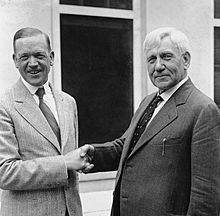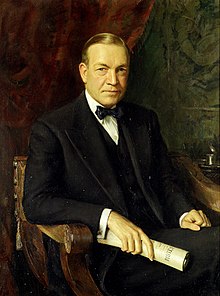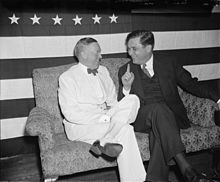Charles L. McNary
Charles Linza McNary (born June 12, 1874 in Salem , Oregon , † February 25, 1944 in Fort Lauderdale , Florida ) was an American politician . He was a member of the Republican Party and, with the exception of a brief interruption in late 1918, represented the state of Oregon in the US Senate from 1917 until his death in 1944 . In the Senate was also since 1933 chairman of the Republican parliamentary group. In the 1940 presidential election , McNary was his party's candidate for vice-president .
Life
Earlier years and political advancement
Charles McNary was born in Salem , the capital of the US state of Oregon , in 1874 . He was the ninth of ten children and grew up in humble circumstances. His father Hugh McNary was a farmer, his mother a housewife. However, she died in 1878. In 1883, McNary was orphaned at the age of nine through the death of his father. However, the older siblings were responsible for him and the younger children of the family. As a teenager and young man, he initially contributed to the family's financial livelihood with farm work and as a newspaper delivery man. In 1896 he moved to the neighboring state of California to study law and economics . However, he returned to Oregon in 1898 at the request of the family. In his private life, however, at the endeavor of a brother, he continued to study law; McNary was later admitted to the bar.
In 1904, he supported his brother John, who wanted to be elected district attorney. After winning the election, McNary was given a key role in his brother's office. At this time he joined the Republican Party , where he belonged to the (now defunct) progressive wing of the party (like US President Theodore Roosevelt ). McNary therefore supported many reforms that were initiated by many progressive politicians at the federal and state level during this period, such as reducing the daily working time to eight hours or the introduction of referendums. In 1913, Oswald West , the governor of Oregon, made McNary a judge in the state court. West and McNary had been personal friends for several years, even though West belonged to the Democratic Party . In 1916 he was elected chairman (Chairman) elected the Republican Party organization in Oregon. Since he showed himself to be willing to compromise with the conservative wing of the party, it was seen as an acceptable occupation for both currents within the party.
senator

US Senator Harry Lane died on May 23, 1917 . For the remainder of the tenure, which lasted until early 1919, Governor James Withycombe had to appoint a successor. The governor then nominated McNary for the successor; he took the oath to become the new senator on May 29th. In November 1918, when the next regular election was due, he was elected for a full six years. He defeated his friend, the Democrat and ex-governor Oswald West. However, both remained friends. Since a by-election for the rest of the current term of office (until March 1919) was held at the same time, he had to give up the seat briefly on November 5, 1918 to ex-Senator Frederick W. Mulkey . However, since Mulkey resigned on December 17 of that year, Governor Withycombie reappointed him Senator for the remainder of the term. In March 1919, McNary then took up his mandate as an elected Senator. The voters of Oregon confirmed him in 1924, 1930, 1936 and 1942 in office.
In 1919 McNary opposed the party line and supported the United States' accession to the League of Nations, which was pushed by Democratic President Woodrow Wilson . He asked for only minor changes to Wilson's concept. The Republican majority in the Senate, which consisted predominantly of isolationists , let the ratification of the accession proposed by Wilson fail. His friendship with faction leader Henry Cabot Lodge , an opponent of the League of Nations, brought McNary into several key roles on various Senate committees. In 1922 President Warren G. Harding McNary offered the post of Secretary of the Interior ; but he refused because he preferred to remain in the Senate.
After the 1932 elections, which were catastrophic for his party, McNary was elected Republican parliamentary group leader when the new Congress met in early 1933 . However, this post was far less influential than its predecessor after the Democrats secured solid majorities in Congress and Franklin D. Roosevelt became president. In the early years of Roosevelt's administration, McNary supported much of the New Deal reforms . Also, to the chagrin of the conservative wing of the party, he refused to bring Republican senators to a more reactionary line that supported Roosevelt's policies. Before his country entered World War II at the end of 1941, he voted for military aid ( loan and lease law ) for the United Kingdom and the Soviet Union , which were at war with the Nazi- ruled German Reich . The Senator from Oregon refused to allow his country to intervene until the attack on Pearl Harbor . Despite their various party affiliations and disagreements on some issues, there was a great personal esteem between McNary and President Roosevelt. If he were to run during the Second World War as part of an election platform for national unity with a Republican runner-up (similar to Abraham Lincoln with the National Union Party in 1864 ), Roosevelt said in background talks, his choice would fall on McNary.
Vice-presidential candidacy in 1940
In the summer of 1940, McNary was made a candidate for the office of Vice President at the Republican Congress . He seemed to be a useful addition to the presidential candidate Wendell Willkie : Unlike the lawyer and political career changer Willkie, he had decades of political experience. Also came from the west coast while Willkie was from the east of the country. Both were, however, to be located in the moderate to liberal wing of the party: the republican electoral platform did not essentially oppose the New Deal reforms, although the efficiency of the programs was to be increased and bureaucracy reduced. In November 1940, Willkie and McNary had to defeat President Roosevelt, who broke with tradition and ran for a third term, and his runner-up Henry A. Wallace (54.7 against 44.8 percent in the popular vote , and 449 to 82 electors ). In McNary's home state of Oregon, too, the Republican team missed a majority of the votes and thus the electors that the state had to assign. Only in the Midwest and parts of New England did Willkie and McNary perform well.
death
In 1943, McNary was diagnosed with a brain tumor. Although he underwent successful surgery in Florida, he died on February 25, 1944, at the age of 69, after the cancer had spread elsewhere. His body was then laid out in the Oregon State Capitol for a few days before he was buried in Salem.
After Wendell Willkie also died in October 1944, it was the only time in American history that both presidential and vice-presidential candidates for a major party died during the term they ran for. After his death, Guy Cordon was named McNary's successor in the Senate by Governor Earl Snell . The parliamentary group was led by Robert A. Taft .
family
McNary married his first wife, Jessie Breyman, in 1902. However, Jessie died in an accident in 1918; the marriage remained childless. In 1923 he married a second time. McNary's second wife, Cornelia Woodburn Morton, had been his secretary before they were married. There were no children from this marriage either, but in 1935 they adopted a girl named Charlotte.
Web links
- Charles L. McNary in the Biographical Directory of the United States Congress (English)
- Biography on salemhistory.net (English)
- Information from the US Senate
Individual evidence
- ↑ Steve Neal: Dark Horse: A Biography of Wendell Willkie . University Press of Kansas, 1989. pp. 62-63
| personal data | |
|---|---|
| SURNAME | McNary, Charles L. |
| ALTERNATIVE NAMES | McNary, Charles Linza (full name) |
| BRIEF DESCRIPTION | American politician |
| DATE OF BIRTH | June 12, 1874 |
| PLACE OF BIRTH | Salem , Oregon |
| DATE OF DEATH | February 25, 1944 |
| Place of death | Fort Lauderdale , Florida |



